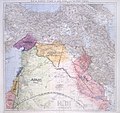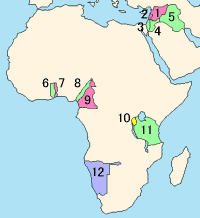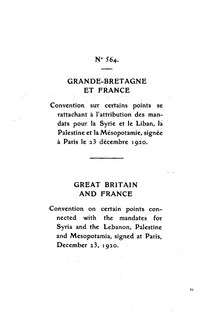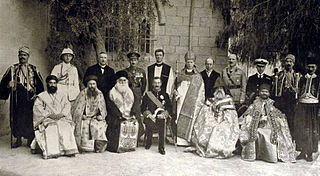It has been requested that the title of this article be changed to Mandate for Mesopotamia (legal instrument) . Please see the relevant discussion on the discussion page. The page should not be moved unless the discussion is closed; summarizing the consensus achieved in support of the move. |
| Draft Mandate for Mesopotamia | |
|---|---|
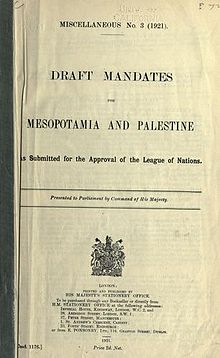 Draft mandates for Mesopotamia and Palestine as submitted for the approval of the League of Nations on December 7, 1920 | |
| Created | 1920 (draft only) |
| Ratified | Not ratified |
| Author(s) | League of Nations |
| Purpose | Proposed creation of the territory of Mesopotamia. The Kingdom of Iraq was created instead |
Part of a series on the |
|---|
| History of Iraq |
 |
| Prehistory |
| Bronze Age |
| Iron Age |
| Middle Ages |
| Early modern period |
| Modern Iraq |
The British Mandate for Mesopotamia (Arabic : الانتداب البريطاني على العراق) was a Mandate proposed to be entrusted to Britain at the San Remo, Italy-based conference, [1] in accordance with the Sykes–Picot Agreement.
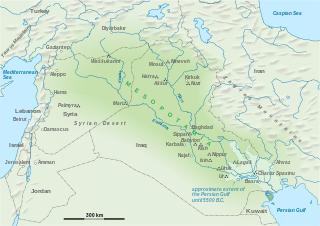
Mesopotamia is a historical region of Western Asia situated within the Tigris–Euphrates river system, in modern days roughly corresponding to most of Iraq, Kuwait, parts of Northern Saudi Arabia, the eastern parts of Syria, Southeastern Turkey, and regions along the Turkish–Syrian and Iran–Iraq borders.

The United Kingdom of Great Britain and Ireland was established by the Acts of Union 1800, which merged the kingdoms of Great Britain and Ireland.

The San Remo conference was an international meeting of the post-World War I Allied Supreme Council as an outgrowth of the Paris Peace Conference, held at Villa Devachan in Sanremo, Italy, from 19 to 26 April 1920. Resolutions passed at this conference determined the allocation of Class "A" League of Nations mandates for the administration of former Ottoman three territories in the Middle East: Palestine, Syria and Mesopotamia. Whilst Syria and Mesopotamia were provisionally recognized as states, Palestine was not.
Contents
The proposed mandate was awarded on April 25, 1920, at the San Remo conference in Italy, but was not yet documented or defined. It was to be a Class A mandate under Article 22 of the Covenant of the League of Nations. A draft mandate document was prepared by the British Colonial Office in June 1920. The Mandate with British administration was enacted via the Anglo-Iraqi Treaty.

Italy, officially the Italian Republic, is a country in Southern and Western Europe. Located in the middle of the Mediterranean Sea, Italy shares open land borders with France, Switzerland, Austria, Slovenia and the enclaved microstates San Marino and Vatican City. Italy covers an area of 301,340 km2 (116,350 sq mi) and has a largely temperate seasonal and Mediterranean climate. With around 61 million inhabitants, it is the fourth-most populous EU member state and the most populous country in Southern Europe.
The Covenant of the League of Nations was the charter of the League of Nations.
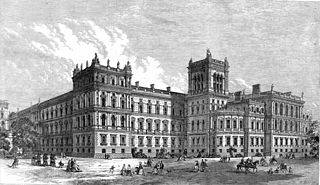
The Colonial Office was a government department of the Kingdom of Great Britain and later of the United Kingdom, first created to deal with the colonial affairs of British North America but needed also to oversee the increasing number of colonies of the British Empire. Despite its name, the Colonial Office was never responsible for all Britain's Imperial territories; for example protectorates fell under the purview of the Foreign Office, British India was ruled by the East India Company until 1858, whilst the Dominions were later carved out as the Empire matured.
The proposed mandate faced certain difficulties to be established, as a nationwide Iraqi revolt broke out in 1920, after which it was decided the territory would become the Kingdom of Iraq, via the Anglo-Iraq Treaty. [1] The Kingdom of Iraq became independent in 1931-1932, [1] in accordance with the League of Nations stance, which stated such states would be facilitated into progressive development as fully independent states. [1]

The Hashemite Kingdom of Iraq was founded on 23 August 1921 under British administration following the defeat of the Ottoman Empire in the Mesopotamian campaign of World War I. Although a League of Nations mandate was awarded to the UK in 1920, the 1920 Iraqi revolt resulted in the scrapping of the original mandate plan in favour of a British administered semi-independent kingdom, under the Hashemite allies of Britain, via the Anglo-Iraqi Treaty. The Hashemite Kingdom of Iraq was granted full independence in 1932, following the Anglo-Iraqi Treaty (1930). The independent Iraqi Kingdom under the Hashemite rulers underwent a period of turbulence through its entire existence. Establishment of Sunni religious domination in Iraq was followed by Assyrian, Yazidi and Shi'a unrests, which were all brutally suppressed. In 1936, the first military coup took place in the Hashemite Kingdom of Iraq, as Bakr Sidqi succeeded in replacing the acting Prime Minister with his associate. Multiple coups followed in a period of political instability, peaking in 1941.
The civil government of postwar Iraq was headed originally by the High Commissioner, Sir Percy Cox, and his deputy, Colonel Arnold Wilson. British reprisals after the murder of a British officer in Najaf failed to restore order. British administration had yet to be established in the mountains of north Iraq. The most striking problem facing the British was the growing anger of the nationalists, who felt betrayed at being accorded mandate status.[ citation needed ]

Iraq, officially the Republic of Iraq, is a country in Western Asia, bordered by Turkey to the north, Iran to the east, Kuwait to the southeast, Saudi Arabia to the south, Jordan to the southwest and Syria to the west. The capital, and largest city, is Baghdad. Iraq is home to diverse ethnic groups including Arabs, Kurds, Assyrians, Turkmen, Shabakis, Yazidis, Armenians, Mandeans, Circassians and Kawliya. Around 95% of the country's 37 million citizens are Muslims, with Christianity, Yarsan, Yezidism and Mandeanism also present. The official languages of Iraq are Arabic and Kurdish.
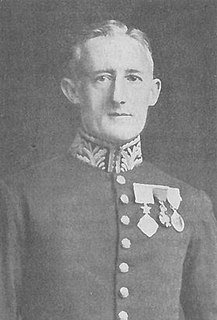
Major-General Sir Percy Zachariah Cox was a British Indian Army officer and Colonial Office administrator in the Middle East. He was one of the major figures in the creation of the current Middle East.
Colonel is a senior military officer rank below the brigadier and general officer ranks. However, in some small military forces, such as those of Monaco or the Vatican, colonel is the highest rank. It is also used in some police forces and paramilitary organizations.
